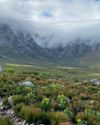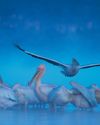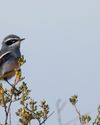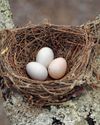
‘Camouflage’ is a useful word these days with all that’s going on in the world, especially for birders, although we never mention it. It’s a kind of unwritten rule, like don’t point or don’t scream your lungs out when you get a lifer.
I do scream my lungs out, though, every time.
In case I was missing something, I looked up camouflage on Google: ‘The disguising of military personnel, equipment and installations by painting or covering them to make them blend in with their surroundings.’ All very useful, but a bit over the top if you’re just going to watch wild birds in the park. The thing is, birders secretly love camou flage and although they froth at the mouth at the concept, it’s rather essential, like breathing. Yet the day before a trip you’ll never hear one say, ‘Don’t forget your camo gear.’
Let’s face it, does your two-metrelong, image-stabilised zoom lens really need to be wrapped in a puzzle of greens and browns as though you’ve just got back from the frontlines of Zaporizhzhia? And come to think of it, is the colour of the Kalahari honestly of any use when you’re out there on deck, below the drifting wings of albatrosses and other such quarry in the middle of a heaving pelagic frenzy? Rhetorical questions notwithstanding, such is the state of our relationship with all things leaf-like and soil-ish in the frantic quest for birds.
Take a step into the shadows, disappear for a while, watch inquiringly and learn.
I guess we are hunters at heart, poetic, bookish ones at any rate.
Esta historia es de la edición January/February 2023 de African Birdlife.
Comience su prueba gratuita de Magzter GOLD de 7 días para acceder a miles de historias premium seleccionadas y a más de 9,000 revistas y periódicos.
Ya eres suscriptor ? Conectar
Esta historia es de la edición January/February 2023 de African Birdlife.
Comience su prueba gratuita de Magzter GOLD de 7 días para acceder a miles de historias premium seleccionadas y a más de 9,000 revistas y periódicos.
Ya eres suscriptor? Conectar

EXPLORING NEW HORIZONS
Keith Barnes, co-author of the new Field Guide to Birds of Greater Southern Africa, chats about the long-neglected birding regions just north of the Kunene and Zambezi, getting back to watching birds and the vulture that changed his life.

footloose IN FYNBOS
The Walker Bay Diversity Trail is a leisurely hike with a multitude of flowers, feathers and flavours along the way.

Living forwards
How photographing birds helps me face adversity

CAPE crusade
The Cape Bird Club/City of Cape Town Birding Big Year Challenge

water & WINGS
WATER IS LIFE. As wildlife photographer Greg du Toit knows better than most.

winter wanderer
as summer becomes a memory in the south, the skies are a little quieter as the migrants have returned to the warming north. But one bird endemic to the southern African region takes its own little winter journey.

when perfect isn't enough
Egg signatures and forgeries in the cuckoo-drongo arms race

Southern SIGHTINGS
The late summer period naturally started quietening down after the midsummer excitement, but there were still some classy rarities on offer for birders all over the subregion. As always, none of the records included here have been adjudicated by any of the subregion's Rarities Committees.

flood impact on wetland birds
One of the features of a warming planet is increasingly erratic rainfall; years of drought followed by devastating floods. Fortunately, many waterbirds are pre-adapted to cope with such extremes, especially in southern Africa where they have evolved to exploit episodic rainfall events in semi-arid and arid regions. But how do waterbirds respond to floods in areas where rainfall - and access to water - is more predictable? Peter Ryan explores the consequences of recent floods on the birds of the Western Cape's Olifants River valley.

a star is born
It’s every producer’s dream to plan a wildlife television series and pick the right characters before filming.